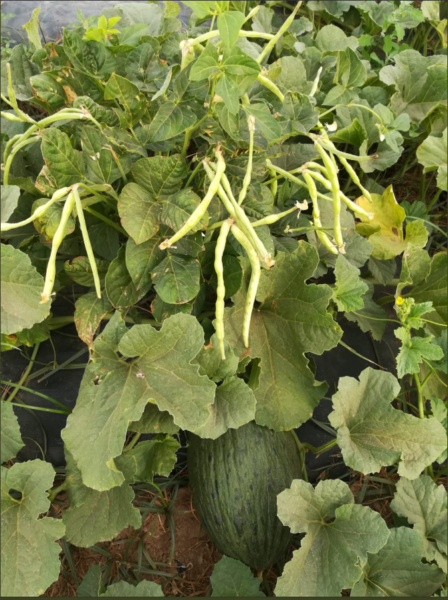The Diverfarming project analysed the nutrients and changes in the soil microbial community in the first year of intercropping melon and cowpea with reduced fertilisation
Intercropping is an agricultural practice that involves growing two or more plant species in the same ground at the same time. This practice enables not only to increase crop productivity, but also to improve soil quality. Moreover, it brings advantages such as reduced pests and diseases and a greater diversity of microbes and beneficial insects.
Although intercropping with some traditional crops has shown high degrees of success, such as maize with bean and pumpkin in Mexico, which is known as milpa, not all intercropping systems constitute improvements, since there must be a balance between the crops used.
With the aim of increasing the environmental and economic sustainability of agricultural systems, a team from the European Diverfarming project has studied the possibility of using this technique of intercropping with the main summer crop for export in the Region of Murcia: the melon.
To deal with the issue of soil and water degradation caused by the excessive use of pesticides and fertilisers in intensive melon cropping, researchers from the CEBAS – CSIC, the Universidad Politécnica de Cartagena (UPCT) and the University of Murcia have analysed the soil nutrients, their physico-chemical properties, the enzyme activity and the soil microbial community (by means of high performance sequencing) of an intercrop of cowpea and melon using ecological farming practices, different growing patterns, and 30% less fertilisation than is usually used in the monocrop.
The results have shown a significant increase in total nitrogen levels, available phosphorus, and total organic carbon, as well as in the melon yield in the first year of intercropping, irrespective of the intercropping patterns followed.
With this combination of crops, the consequences of which had not been studied to date, changes occurred in the bacterial community structure which correlated with an increase in the concentrations of total nitrogen and phosphorus in the soil and in the melon crop yield. Additionally, a greater abundance of beneficial microorganisms such as Pseudomonas, Bacillus, Streptomyces and Sphingomonas was found.
Thus, in the first year the combination of cowpea with melon gave as its result a sustainable growing system that used fewer external inputs and increased the melon yield, as well as improving the soil quality. Taking into account that from the first year, the use of diversified growing systems provides a regular supply of food and income, longer term analysis of these intercropping systems will be required. This should reinforce the findings on the positive interaction between the cowpea microbiota and melon and their functions and to study in greater detail which intercropping pattern would be the most beneficial for the grower.
With this study the knowledge of the advantages of diversified growing systems moves forward; this is one of the strategies of the Diverfarming project financed by the European Commission within the H2020 programme, which seeks a change in paradigm in European agriculture.
Diverfarming is a project financed by the Horizon 2020 Programme of the European Commission, within the challenge of “Food Security, Sustainable Agriculture and Forestry, Marine, Maritime and Inland Water Research and the Bioeconomy”, under agreement 728003. It counts on the participation of the Universities of Cartagena and Córdoba (Spain), Tuscia (Italy), Exeter and Portsmouth (United Kingdom), Wageningen (Netherlands), Trier (Germany), Pecs (Hungary) and ETH Zurich (Switzerland), the research centres Consiglio per la ricerca in agricoltura e l’analisi dell’economia agraria (Italy), the Consejo Superior de Investigaciones Científicas (Spain) and the Natural Resources Institute LUKE (Finland), the agrarian organisation ASAJA, and the companies Casalasco and Barilla (Italy), Arento, LogísticaDFM and Industrias David (Spain), Nieuw Bromo Van Tilburg and Ekoboerdeij de Lingehof (Netherlands), Weingut Dr. Frey (Germany), Nedel-Market KFT and Gere (Hungary) and Paavolan Kotijuustola and Polven Juustola (Finland).









